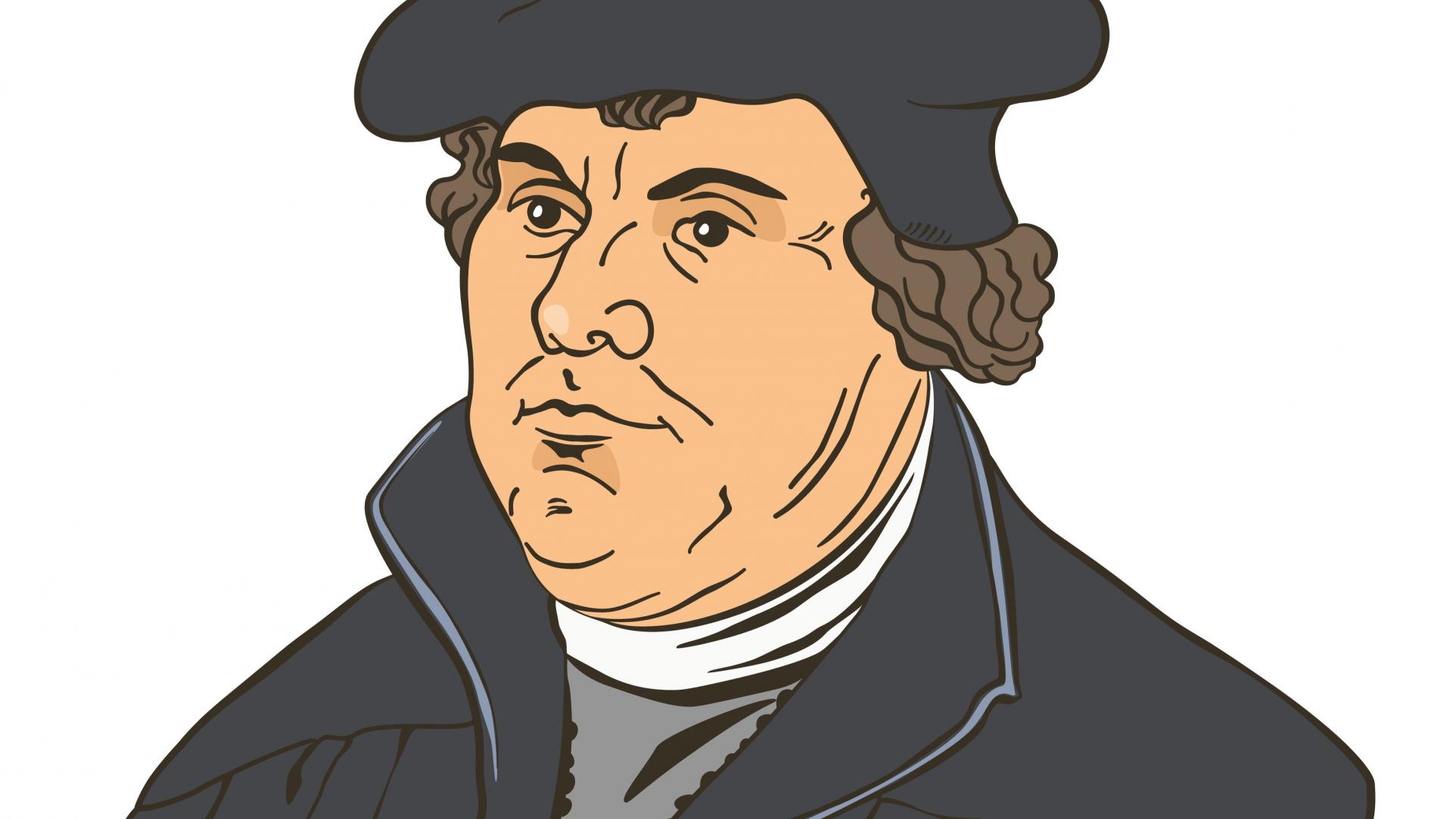Martin Luther grew up in a very difficult time in world history. Born in 1493 to a poor German family, he was raised in a society dominated by the Medieval Church. The Church controlled every aspect of living. Taxes were paid both to the state and the Church, with the state being subservient to the Church. Church services had to be authorized by the Church and were always conducted in Latin, even though the majority of parishioners were unable to understand any of the services. It was illegal for the common people to read the Bible, and it was even a punishable offense to teach one’s children to pray in their own language. Latin prayers were the only prayers that were to be recited. If one held a different opinion in politics, religion, or science than that of the Medieval Church, they were quickly arrested and burned at the stake. Millions of Europeans groaned under the weight of religious and political tyranny.
Luther grew up thinking this was normal. Although his parents were extremely strict and not always loving, he was grateful that they taught him to respect God. They did not have much knowledge but they relayed what they did know. He exhibited an incredibly bright intellect at a young age, and his parents encouraged him to pursue law. He did well at the different schools that he attended, enjoying the academic stimulation and companionship of other boys his age.
His life changed drastically in 1505. A plague had once again swept through the community, and some of his young companions had perished. Saddened and discouraged, he left his school and traveled home. On the way, a severe storm broke out, and it seemed like he would perish. As the lightning flashed and the thunder clapped around him, he cried out in prayer. Having been taught to pray to the saints, he begged Saint Anna to save his life, and if she did, he would become a monk. To a young boy with academic and social aspirations, becoming a monk meant that he would give up hopes on higher education, marriage, and even close relationships with family and friends. He would seclude himself in a monastery, to spend the rest of his days in study, prayer, and mortifying the flesh, which consisted of various methods of hurting oneself to purge the flesh of sin.
The storm quickly abated, and Luther soberly made it home, telling his parents about his experience and promise. He was a young man of his word and quickly went about making arrangements to join a monastery. Despite his parents pleading with him to finish his education and pursue a career in law, he resolutely pushed on. This led to his father not speaking to him for two years.
Luther joined a local monastery and settled into the daily routine. He exchanged his clothes for a coarse brown robe and shaved the crown of his head. He was increasingly convicted of his sinfulness and sought to purge his flesh of sin by whipping himself, going without food, laying in the snow without clothes, and spending hours confessing his sins to a priest. As soon as he would leave the confessional, he would be struck with fear, thinking that any relief he felt was pride, which was another sin that he then felt he needed to confess. He was both physically and spiritually broken.
Seeing that he was utterly miserable, a supervisor of the monastery, Johann Staupitz, encouraged him to look to Jesus, not himself. Luther discovered a Latin Bible that was chained to a monastery wall, and as soon as he began reading, he could not stop. Hour after hour and day after day was spent soaking up the words of truth. He began to realize that nothing he could ever do would win God’s favor. The scales began to fall off his eyes, and he sought to share this news with others. He was transferred to a university town where he began teaching the Bible. The courses were in Latin under the authority of the Medieval Church and only available to the educated elite, but as Wittenberg was a small town, he was soon able to share with the locals as well.
Still fully immersed in the teachings of the Church, he planned to make a pilgrimage to Rome. With the new Spiritual truths flashing through his mind, he thought that other Church leaders he met with on the way would help him in his walk with Christ. However, as he encountered the cursing, lewd joking, feasting, and love of wealth that was displayed by the majority of German and Italian priests that he interacted with, he became more discouraged.
After walking 1000 miles on foot, he finally entered Rome, crying aloud, “Hail to thee, holy Rome!” Going to Scala Sancta as many religious pilgrims did, he prepared to do as he had been taught. According to the Medieval Church, Saint Helena had transported these steps from Pilate’s palace to Rome in the middle of the night. Pilgrims could receive forgiveness of sins by the Church if they climbed them repeating the Latin prayers that they had been taught. Luther began climbing these marble steps on his hands and knees, but just then a Bible verse that he had recently studied flashed through his mind, “The just shall live by faith” (Romans 1:17).
Then and there he realized that nothing he did could earn salvation. It was God’s grace alone that could save mankind. This Bible verse changed his life and the course of history. Never again was he the same man.
He returned home to Wittenberg, more committed to studying the Bible. A few years later, he changed the world with his “95 Theses,” citing 95 reasons why indulgences (prepaid certificates of forgiveness) were unbiblical. He began to preach that salvation could not be earned, that prayers should be directed to God instead of the saints, and that Christians should have freedom of conscience. The Medieval Church severed ties with him, condemning him as a heretic and made many attempts to kill him throughout the rest of his life. However, God did not allow him to fall into their hands.
He went on to become a prominent theologian, publishing countless books and tracks on salvation by faith. He sought to give the German people something better than the meaningless Latin chants that they were taught to sing. He began writing powerful hymns in the language of the people, his most famous being, “A Mighty Fortress is Our God.” His most enduring work before his death was the translation of the Bible into German. For the first time in history, Germans did not have to learn Latin to read the Bible; it was now in their tongue. With the recent invention of the printing press, millions of copies were soon distributed all over Europe, spurring other countries to start publishing the Bible in their language.
When he completed the work which God had for him, he was allowed to die peacefully in his sleep at 63 years old. 500 years later, we continue to reap the rewards of his labor. Luther did away with the tyranny of the Medieval Church and shattered its unity. His protests against the abuses of the Medieval Church led to the establishment of Protestant churches and freedom of thought. He began the separation of church and state, which led to the diminishment in the power of the Medieval Church. This allowed the Protestant churches to structure themselves as a democracy, not a hierarchy and ultimately led to the formation of democratic nations, such as the United States of America. Most importantly, he gave ordinary people access to the Bible – translated into their language.
The life of Martin Luther has been the subject of many books, most notably in chapters 7 through 11 of Ellen White’s bestseller The Great Controversy. The secret to his success is available to all of us. He spent hours studying the Bible, famously stating: “The Bible is a remarkable foundation: the more one draws and drinks of it, the more it stimulates thirst.” He also believed that Christians should always be in a state of prayer, even as they fulfill their secular responsibilities, reminding us that: “To be a Christian without prayer is no more possible than to be alive without breathing.”
Call to Action
The same source of strength that was available to Martin Luther is available to us today. Why not take a minute to make a Bible study and prayer plan? You can peruse other articles on this website to get ideas. Being systematic in your Bible study and prayer will equip you with the same courage and fortitude that Luther had, and you can then go on in faith to do great things for God!
All scripture taken from the King James Bible.




